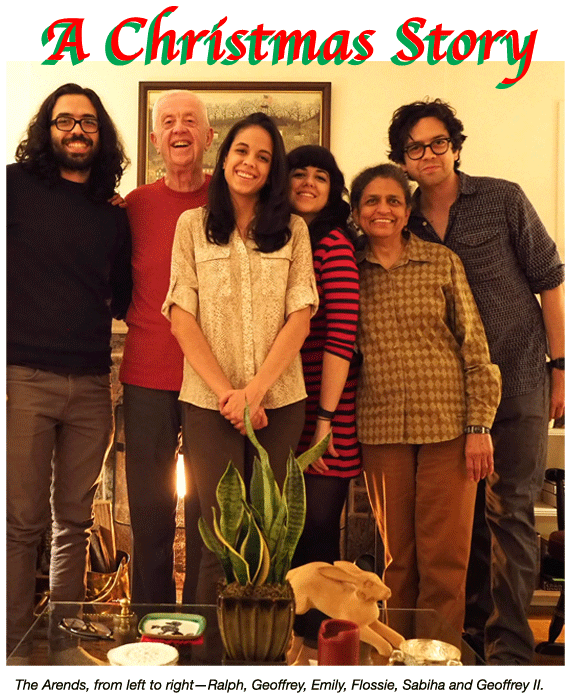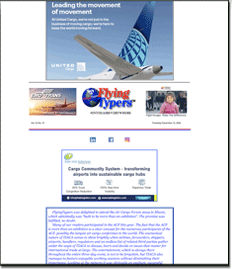
Every year around this time, we struggle
to find new words to offer to our loyal FlyingTypers readers.
I am not immune to the warm responses
inspired by our annual Christmas story, and I would be posturing if
I said it doesn’t feel good to know it is so well received.
However, the pressure mounts to say something new; to not rehash the
things you already know; to provide some meaningful insight into our
holiday gathering.
You know we are
a family business in an age when most companies yearn to proclaim
that simply for the feel-good cachet it affords them. People love
a good legacy story.
We are about
to celebrate our 50th anniversary as a publishing force in air cargo
and no, you can’t put a price on that. In a world where everything
has been commodified, you still can’t buy time or experience.
My father, mother, and I—sprinkled
with some help from my siblings—run the gamut of responsibilities
to keep FlyingTypers and our FlyingTypers Broadcast
current, interesting, successful, and engaging, and we do it every
hour of the day, every day of the week, 365 days a year.
This
is not an exaggeration. I return home for holidays and it has become
routine to ‘take a meeting’ in the living room with my
father, whether it’s pre-Thanksgiving dinner or post-New Year’s
Day celebrations. We have a drink and warm by the fire, and I have
the bonus of petting a very sweet dog when these conversations occur,
but we are still working.
Time
off isn’t just a luxury—it’s a frivolity. You don’t
become an industry leader lying on the beach.
This
year, I shook my brain like a snow globe to see what new holiday tradition
might flutter to life and reveal itself as an interesting share. You
know about the Santa-decorating tradition; the pancakes; the sausage;
the presents; the tree; the movies; the pizza parties. What can I
tell you that you don’t already know? For as cloistered as our
family holidays can be—immediate family only—we routinely
open our proverbial doors to the FlyingTypers community.
So what haven't you heard?
My father
talks about air cargo a lot. He is the most dedicated, hard working
person I know in the air cargo business aside from my mother. If he
isn’t talking about air cargo, he’s talking about music,
or aviation in general. But air cargo and its people are always at
the forefront of his mind. The air cargo community is his great concern.
And as anyone who has sat down with him for an interview well knows,
once you get him started it’s best to just get out of his way
and let him go. You learn more that way.
I
am not an aviation historian, and my knowledge of air cargo barely
breaks the surface of what my father knows. It can be difficult, then,
to engage in the conversations he finds most comfortable. And here
is where I tell you something about our Christmas that you do not
know, and have not heard.
Every year for the past several years, I have accompanied my parents
to St. Luke’s Episcopal Church in Forest Hills, Queens. I’m
not remotely religious, but as an introvert I enjoy the quiet, solemn
atmosphere of the church, where the common greeting is a subtle head
nod and a slow blink. I don’t particularly follow the services,
either—I am, admittedly, there for the choir songs, the music,
the ceremony, and the feeling of the environment, and I have a sneaking
suspicion my father is there for the same reason.
Built
in the 13th century English Gothic style, St. Luke’s has a high,
vaulted ceiling with wood beams that bend and bow inward, like the
hull of a ship flipped upside down. It’s a light, airy space,
filled with rich, dark wood and cool stone, and in the winter warmed
and lit with dozens of candles, which hold sentry at various perches
around the church, under windows, above aisles, and lined along golden
candelabras.
My father began attending
St. Luke’s when he first moved to New York from Chicago at the
age of 11. It was at St. Luke’s that he studied the catechism
for children—every year, he points to the uppermost peak of
the church above the entrance and says, “I studied in a small
room called the narthex, with other children who were all younger
than me.”
The beloved butter
cake we consume every year for Christmas began as a post-church treat
for my father. Back then, it cost him 99 cents and was purchased from
a German bakery on his walk back home.
My
father’s “spiritual guide,” as he calls him, was
a dramatic, energetic man named Reverend Thomas Blomquist, who once
worked as a batboy for the Brooklyn Dodgers at Ebbets Field in Brooklyn.
According to my father, his confirmation as a member of St. Luke’s
did not result from his understanding of the doctrine, but rather
because “I knew so much about baseball.” My father was
confirmed with holy water drawn from a clamshell baptismal font that
still sits on its pedestal today. It is so large I would not be surprised
to learn it originally birthed Venus on the shore. In writing this
I learned that Rev. Blomquist had served as a naval chaplain during
World War II; he brought the giant clamshell from the South Pacific
when he returned back home. Fifteen years old at his baptism, my father
was taller than the reverend, who had to reach up, standing on his
toes, to pour the water over his head.
To
this day, my father claims “baseball and butter cake”
made him “as much a Christian as the Baby Jesus,” but
I think it was more than that. My father, ever loquacious, always
filled with information he longs to share, grows solemn, respectfully—almost
dutifully—silent when we attend St. Luke’s on Christmas
Eve. Air cargo, the subject about which we have revolved our lives,
retreats like a fog back out to sea as we moor ourselves to the choir’s
clarion call. Music, my father’s other ever-present passion,
rolls in and permeates our thoughts. We open our hymnals and sing
along, and my father sings, and I imagine he remembers himself as
a young boy learning about faith, community, and being one with others.
I imagine this is where he learned how to create a space for the family
he would one day make, how to create a space for the cargo community—where
he learned to share, and listen, and quiet his mind. Every other day
of the year he animates with talk about lithium batteries, security,
historic preservations, and the wonderful companies with which we’ve
formed a cargo family. At St. Luke’s, for the two hours we are
singing, listening, and clearing our thoughts, a cleaner, uncomplicated
version of my father emerges. One that once walked himself home after
lessons in the stony narthex above a modest but beautiful church,
that talked baseball with a kind and loving spiritual father, a boy
who stopped at a German bakery for 99-cent butter cake.
On
Christmas Eve, I share with my father something other than air cargo.
We sit and listen to exquisite voices rising high to the rafters in
harmony, we join our voices to the stream of sound and let it fill
us as it fills the space. There is nothing quite like voices singing
together on one of the darkest days of winter. It does something to
the mind and body when you give yourself over to it—if you've
ever wanted to feel at one with those around you, go somewhere you
can sing with people.
We love you,
air cargo, but I cherish the man who comes home from St. Luke’s
without the cargo monkey on his back. Geoffrey Arend, Patron Saint
of Air Cargo Reportage, inevitably reemerges on the first of the New
Year, but the cargo community should take comfort in this brief respite.
It’s what makes him so good at being a part of this community—it’s
the spirit that revives his passion for the year.
We
hope you enjoyed this peek into another corner of our Christmas, and
I can only hope to have something new and interesting to share next
year.
Until then, FlyingTypers
wishes you and yours a very Merry Christmas and a Happy and Healthy
& Happy New Year 2025!
Flossie
Arend |
|





